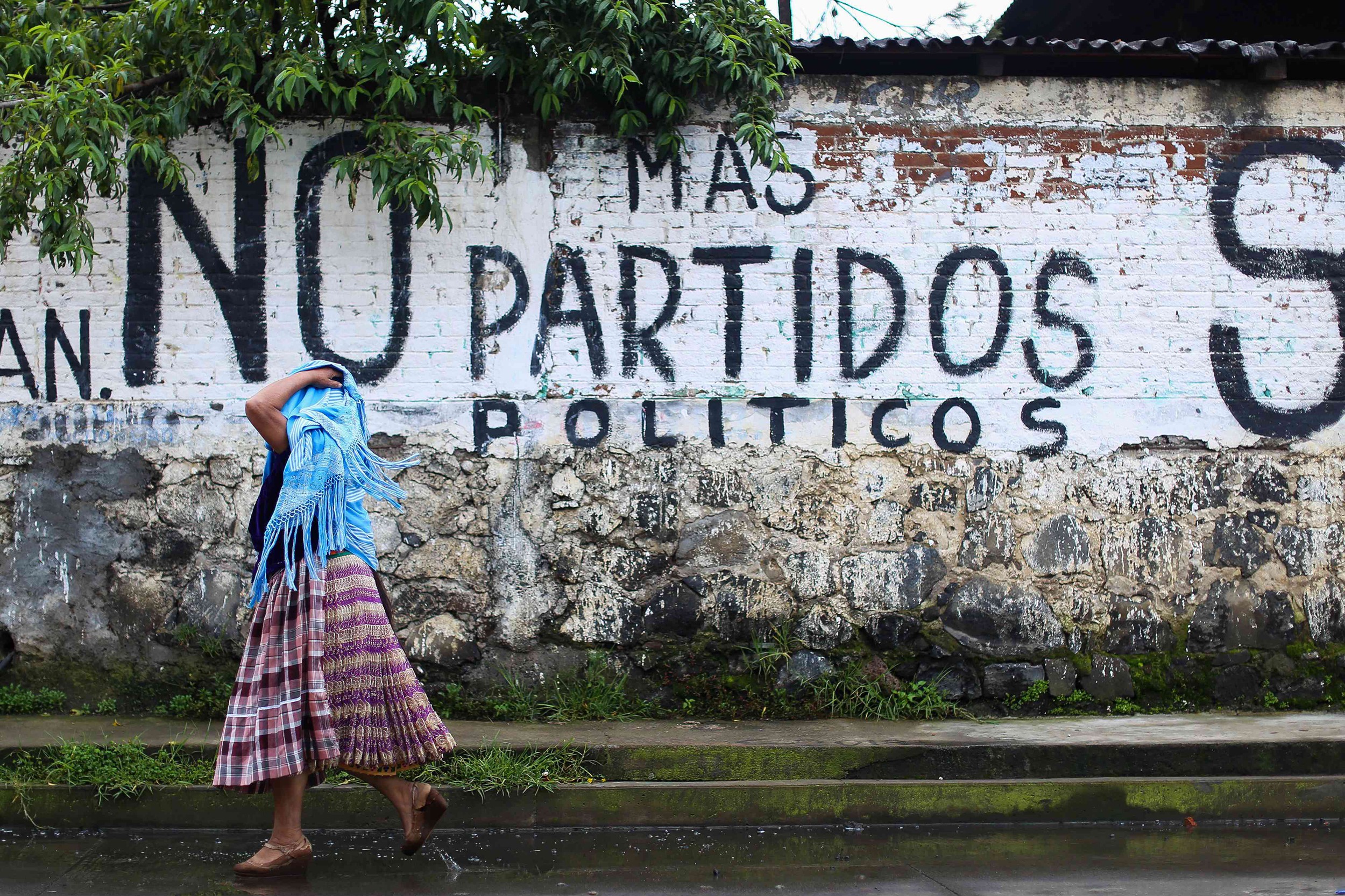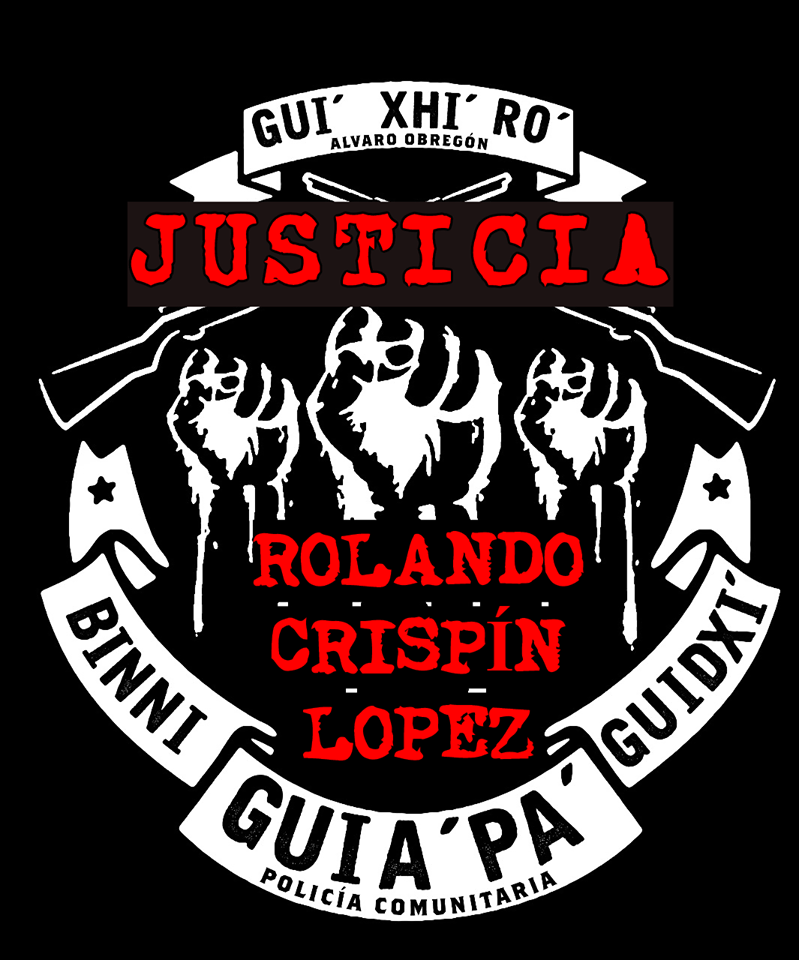Filed under: Capitalism, Indigenous, Mexico, Repression, The State

The following article by Voices in Movement looks at indigenous resistance, state repression, and capitalist expansion in Mexico in the aftermath of the recent national elections.
Following the election of Andrés Manuel López Obrador as the president of Mexico on July 1st, 2018, a series of inconsistencies have emerged in the discourse of the president-elect and his incoming administration. While these inconsistencies are important in and of themselves, they are clear examples of the general contradictions inherent to the nation-state and capitalist systems that will continue under the new administration which is to take power on December 1st, 2018.
On July 7th, 2018, it was announced that the incoming López Obrador administration was organizing a plan of action to transform the relationship between the Mexican government and the Indigenous peoples of Mexico. Central to this announcement, is the plan to reform the constitution of the Mexican Republic in order to fulfill the San Andrés Accords that were made between the Zapatista Army of National Liberation and the Mexican government. While the accords were signed by both the EZLN and the Mexican government on February 16th, 1996, they were never fulfilled by the Mexican government. The unwillingness of the Mexican government to fulfill these commitments with the Indigenous peoples of the country, led to a change in political strategy. From the failed dialogues, the Zapatistas along with many Indigenous and non-Indigenous struggles throughout the country, have taken on a much more autonomous political orientation.
López Obrador’s announcement of his administration’s commitment to fulfilling the San Andrés Accords directly contradicts statements made by the incoming Chief of Staff, Alfonso Romo. The multimillionaire Alfonso Romo has committed to making Mexico, “a paradise for foreign investment.” Fundamental to this “paradise for foreign investment” is the continuation of Special Economic Zones implemented by the current Peña Nieto administration in the Federal Law of Special Economic Zones signed in 2016. Special economic zones are designated areas where laws are changed to incentivize foreign investment and economic development. They include guaranteed cheap labor, lower taxes, exclusive territorial control for companies and the government’s right to expropriate territories in these zones.[1] When Romo was asked if he supported Special Economic Zones, he responded: “Perhaps we will make them larger. Everywhere. Chiapas, Oaxaca, Guerrero. What do you leave out? You can’t leave anything out.”[2]
The discourse justifying the implementation of the Federal Law of Special Economic Zones by the Peña Nieto administration, was the inequality that exists in Mexico, and specifically the marginalization and poverty of the southern-southeastern region of the country. According to official logic, these special economic zones will, “…elevate productivity in the south-southeast…to establish the structural conditions to generate more wealth and opportunities of development for the population”.[3] It is important to note that the southern-southeastern part of Mexico is the most resource rich and culturally and biologically diverse part of the country. The first four special economic zones declared were the Port of Lázaro Cárdenas on the border between Michoacán and Guerrero; the Interoceanic corridor of Tehuantepec which includes Coatzacoalcos, Veracruz and Salina Cruz, Oaxaca; the Port of Chiapas, in Chiapas; and the Corridor Coatzacoalcos-Tabasco-Campeche. These are all zones with significant Indigenous territory and ongoing Indigenous resistance.

“No more political parties.”
The present contradictions between neoliberal extractive economic interests and the interests and self-determination of Indigenous peoples have been clear in the past couple weeks in Mexico. On July 15th, 2018, in the municipality of Ayutla de Libros, Guerrero, hundreds of community members met to elect their authorities according to their uses and customs outside of the political party model. From the face to face elections, a Municipal Community Council and Council of Security and Justice were elected made up 240 representatives including 120 men and 120 women.[4] This movement toward municipal self-governance contradicts the interests of both the nation-state and capital in maintaining sovereign power over territory and the capacity to extract resources that the territory holds.
On July 13th, 2018, the Indigenous P’urhépecha municipality of Nahuatzén, Michoacán released a communique denouncing the attempted implementation of a political party municipal president against the will of the community. On the days leading up to the election on July 1st, the community refused to allow the installation of voting booths in their community citing their ongoing struggle for self-organization and self-government. While an election never took place, the Electoral Institute of Michoacán has certified the “election” of PRD candidate, David Eduardo Otlíca Aviles, as the legitimate municipal president. Refusing to submit to this electoral farce, the community has committed to continue organizing themselves in an Indigenous Citizen Council, to carry out collective work and decision-making in the community and municipality as a whole.[5]
The tensions between the interests of the state and capitalism and the self-determination of the Indigenous peoples have recently taken on a more violent character in the state of Oaxaca. On July 17th, 2018, Abraham Hernández González—regional coordinator of the Indigenous organization CODEDI (Committee for the Defense of Indigenous Rights)—was kidnapped from his home in the town of Salchi, Oaxaca, by armed and masked men. Some hours later, he was found dead, brutally beaten. This attack from the narco-state comes on the heels of another violent attack carried out in February of this year against CODEDI, leaving three other members dead just outside of the town of Miahuatlán, Oaxaca. In response to these ongoing violent attacks, the organization has committed to forming community police units in their communities, to defend themselves against this capitalist and state violence.

On July 22nd, 2018, in the community of Álvaro Obregón, Oaxaca, Rolando Crispín López, a member of the Assembly of Indigenous Peoples in Defense of Land and Territory in the Istmo of Tehuantepec, was assassinated on the street after carrying out his shift as a member of the community police. Since 2012, the community of Álvaro Obregón has been struggling against wind-farm megaprojects on their territory. As a consequence of this resistance, the community members, participants in the Assembly of Indigenous Peoples in Defense of Land and Territory, along with members of the community police force of Álvaro Obregón have faced ongoing aggressions and violence at the hands of those with interests in the wind-farm megaprojects. The community police and land defense in the region, and the ongoing repression of such self-organized resistance, exemplifies the contradictory forces and interests between the Indigenous people and the state and capitalism.
In Chiapas, the Zapatista Army of National Liberation denied false reports suggesting they had solicited or agreed to dialogue with the president elect Andrés Manuel López Obrador. These reports came from Alejandro Solalinde, a Catholic Priest and human rights activist, in a clear attempt to drive divisions into the Zapatista movement with the new incoming administration. The Zapatistas made clear in a communique just days after the election that they have no interest in supporting the new government. They wrote, “P.S. No, we Zapatistas do NOT join the campaign, for the good of all, first the distribution of cushy jobs. They can switch up the overseers, foremen, and supervisors, but the plantation owner remains the same.”[6] As has been their practice for nearly 25 years, the Zapatistas have committed to, “…resistance and rebellion…because freedom can only be achieved through struggle”.[7]
The declaration by the incoming López Obrador administration to reform the constitution and recognize the San Andrés Accords, while seeking to ease the contradictions between the interests of the nation-state, capitalism and the self-determination of the Indigenous peoples, will only reinforce those very contradictions. While the San Andrés Accords, in their moment, sought a constitutional reform to recognize Indigenous self-determination and self-government in the social, cultural, judicial, political and economic spheres within the confines of the nation-state framework, the autonomous movements of Indigenous peoples have only strengthened since that time. It has become clear, at least in my eyes, that the nation-state and capitalism cannot go on existing if the demands of Indigenous and campesino communities are met. Local autonomy, self-organization and self-government threaten the sovereign demands of the nation-state and the extractive and exploitative demands of capitalism. These are unresolvable contradictions.
The recent violent attacks on Indigenous land defenders and community self-organization, along with the strengthening movements for Indigenous self-government throughout the country, highlight the incapability of any administration—right, left or center—to resolve deep-seated institutional contradictions. Rather than seeing constitutional reforms and recognition politics as the solution, it seems the only viable future rests in the deconstruction of the nation-state and capitalism, and the transformation of society according to the demands, interests and practices of the people organizing from below.
Footnotes:
[1] https://www.laizquierdadiario.mx/En-defensa-de-la-vida-pueblos-indigenas-contra-el-despojo-de-las-Zonas-Economicas-Especiales
[2] https://www.forbes.com.mx/mexico-tendra-que-ser-un-paraiso-de-inversion-alfonso-romo/
[3] https://www.gob.mx/zee/documentos/libro-zonas-economicas-especiales-el-gran-proyecto-de-nacion
[4] http://radiozapote.org/2018/07/17/ayutla-celebra-elecciones-sin-partidos-politicos-bajo-el-esquema-de-usos-y-costumbres/
[5] http://voicesinmovement.org/nahuatzen-michoacan-press-release-we-will-not-permit-the-imposition-of-political-parties/
[6] https://radiozapatista.org/?p=27617&lang=en
[7] http://enlacezapatista.ezln.org.mx/2018/07/17/desmiente-el-ejercito-zapatista-de-liberacion-nacional-contacto-alguno-con-amlo-comunicado-del-ccri-cg-del-ezln/





